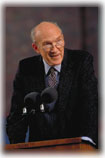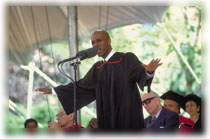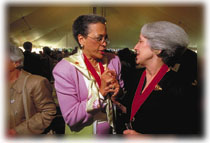![]()
Main Menu · Search · Current Issue · Contact · Archives · Centennial · Letters to the Editor · FAQs
![]()
Main Menu · Search · Current Issue · Contact · Archives · Centennial · Letters to the Editor · FAQs
 Alan Simpson addressed the seniors on Class Day. "I didn't graduate cum laude," he confessed. "I graduated thank-the-Laude." Alan Simpson addressed the seniors on Class Day. "I didn't graduate cum laude," he confessed. "I graduated thank-the-Laude." |
The principal commencement speaker at the Massachusetts Institute of Technology this year was Click and Clack The Tappet Brothers (MIT graduates Thomas '58 and Raymond '72 Magliozzi), hosts of National Public Radio's Car Talk. Harvard had a more establishment lineup.
Featured Commencement afternoon, June 10, was Alan Greenspan (see "The Value of Values"). David R. Gergen, LL.B. '67, IOP '84-- former adviser to four presidents and now a public service professor at the Kennedy School of Goverment --spoke at the Law School's Class Day ceremonies June 9 about the bad things commercialism has done to the legal profession. Former Red Cross president Elizabeth H. Dole, M.A.T. '60, J.D. '65, praised free enterprise at the Business School; she spoke last year at the Kennedy School, which this year was addressed by Rev. Jesse L. Jackson Sr. (see "Living Wages?"). Surgeon General David Satcher, M.D., spoke June 10 at the Medical School, reminding his listeners of their ability to contribute to the public- health agenda.
Johnnetta B. Cole, former president of Spelman College and this year's recipient of the Radcliffe Medal, held forth at the June 11 luncheon of the Radcliffe College Alumnae Association. She warned against a curriculum limited by the three Ws-- "white, Western, and womanless."
 Orator Selamawi Asgedom '99, who graduated cum laude in history. Orator Selamawi Asgedom '99, who graduated cum laude in history. |
Former Wyoming senator Alan K. Simpson, who now heads the Institute of Politics at the Kennedy School, became the seniors' Class Day speaker by default after he invited, on their behalf, Oprah Winfrey, John Glenn, and Colin Powell, all of whom declined. When he stepped to the podium in chilly Tercentenary Theatre (the space between Widener Library and Memorial Church) on June 9, the temperature no better than 60 degrees, he deadpanned, "They told me it would be a cold day when they invited me to be Class Day speaker, but this is ridiculous."
"I don't remember any commencement address of any kind that I ever sat through. None," said Simpson. Martha Minow, the Phi Beta Kappa orator, does remember one in its entirety, and proved it (see "The Uses of Memory").
In the course of his Latin salutatory, one of the student "parts" traditional in Harvard's Commencement exercises, Quentin Chu '99, of Pforzheimer House and Hong Kong, addressed Alan Greenspan as follows: "O Praefecte Greenspane, tam benevolens clemensque sis ut ordo faenoris numquam crescat!"--an appeal that he never raise interest rates.
 Johnnetta Cole with President Linda Wilson. "The trouble with a woman standing behind her man," said Cole, "is that she can't see where she is going." Johnnetta Cole with President Linda Wilson. "The trouble with a woman standing behind her man," said Cole, "is that she can't see where she is going." |
The other two student speakers that morning might not have seemed at birth to be likely candidates for the job. Selamawi Asgedom '99, half Ethiopian, half Eritrean, of Pforzheimer House and Wheaton, Illinois, lived as a child in a Sudanese refugee camp. His family owned nothing they did not carry with them. "On many a night, we slept out in the open," said Asgedom, "and my mother warned that if we let the covers down, snakes could slip in and slither into our mouths. We had no trouble following her advice." He still pulls his sheet over his face each night ritualistically, but has learned to stick his neck out in other ways. It is now time, he told his classmates, to cast off the covers, to "face the snakes and drive them away."
Hazel Edney, M.P.A. '99, of Richmond, Virginia, a mid-career student at the Kennedy School, in her graduate English address touched on her childhood. "For who would have believed that this country girl, who grew up in a warm and loving home in the South with no running water, no indoor plumbing, who strayed and became a teenaged delinquent, a disruptive student, a mother applying for welfare at the age of 15, who would have believed that I would have made it thus far on my way? The fact that even I--out of my weary past-- could have earned the opportunity to stand here today as a Harvard graduate is a testament to the hope that true freedom--through prayerful determination, hard work, and reaching out--can bring. Does this not give hope for the American dream?"
Main Menu · Search · Current Issue · Contact · Archives · Centennial · Letters to the Editor · FAQs
![]()